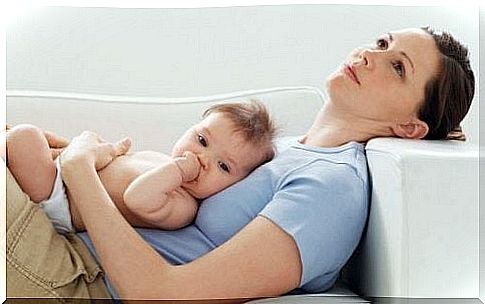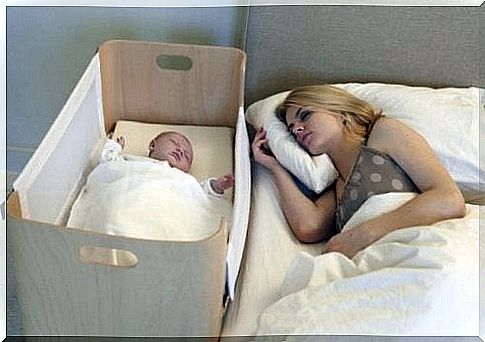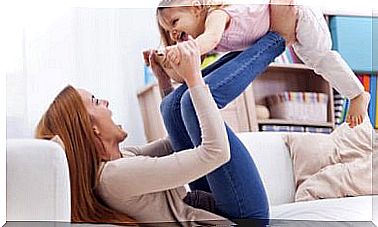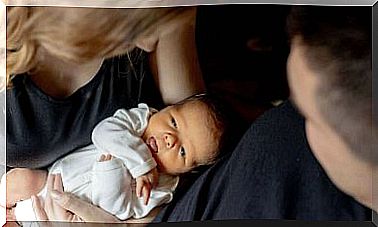Why Does The Baby Only Sleep In Your Lap?

Most babies only sleep on their mother’s lap. However, many mothers wonder if this is normal or should be a concern.
Babies perceive the mother’s lap and its warmth as a safe place, and therefore they fall asleep more easily. The lap is safer and more pleasant for the baby, and that is why the baby usually wakes up immediately when you try to lower him to his own bed.
Many pediatricians believe that a baby should not think of a mother’s or father’s lap as a place to sleep. However, it is good to remember that every baby and family is their own, and what is generally accepted may not work for all families.
All it takes for each parent to find a suitable alternative is time, patience, and love.
Why does the baby just fall asleep in your arms?
Many parents who face this situation wonder if something is wrong. It’s important to understand that there’s nothing wrong with that, and falling asleep in your arms doesn’t tell you about any major problem. Especially if the baby is less than 6 months old, learning routines is important and it creates a sense of security for the baby.
If a family bed is not used in the family, it would be good for the baby over the age of 6 months to sleep in his or her own bed and think of it as a place where he or she will fall asleep and wake up. However, this does not mean that you cannot hold your baby in your arms and comfort him when he needs this. You can then lower the baby back to their own bed.
In the following, we look at sleeping and how it changes as your baby grows.
Up to 6 months, the most important thing is a sense of security

Until the age of six months, it is absolutely essential that the baby feels safe. The child’s brain matures by the age of seven. The first major stage of maturation occurs at the age of 3, when myelin covering the neural networks of the brain and electrochemical pulses allow the child to regulate his sleep rhythm.
It is normal for a small baby and child to wake up several times a night. Nevertheless, it is important to strive to develop routines and a good sleep rhythm as soon as possible.
- Until the age of six months, the most important thing is that your baby feels safe, and that’s why it’s important to keep your baby in your arms as much as possible.
- Remember that your baby has spent the last nine months in the warmth and safety of your uterus, and sleeping alone in bed is not natural for it.
- Keep in mind that each baby is its own individual, and therefore not all babies have difficulty sleeping in their own bed immediately after birth.
Don’t worry if your baby just wants to sleep on your lap. This is not a symptom of any other problems, nor does it mean that the child will not be able to become independent as it grows. Until the age of six months, it’s important to be patient, and there’s nothing wrong with letting your baby sleep only in your arms.
How do you get a baby to sleep in their own bed?

The most important thing is that the baby develops routines regardless of age. Don’t feel guilty if your baby is sleeping in their own bed, as this by no means means you can’t give your baby just as much intimacy.
If your family does not use a family bed, it would be important to strive for the baby to sleep in their own bed. Here are some tips for learning it:
- Sow the baby before going to bed.
- Feed your baby before going to bed, but if he’s not hungry, don’t force him to eat.
- Gently lay the baby in his or her own bed and hold him or her in your arms for as long as possible.
- Stroke the baby’s cheek or hand after you put him to bed, as this will make the baby feel safer and understand that you are close to him.
Leave one of your own clothes in the baby’s crib to increase your baby’s sense of security. When you leave one of your garments next to the baby, she recognizes the mother’s scent and thus feels safer. The sense of smell is the most developed sense in babies under 6 months of age.
Be patient – don’t force your baby to sleep in their own bed

It is normal for the parents of a small baby to be tired and desperate to want the baby to sleep in their own bed. When a child sleeps only on his or her lap and refuses to sleep in his or her own bed, this increases parental frustration, which often causes problems in the relationship.
However, keep in mind that:
- Sleeping is not a skill that could be learned or taught, such as reading. Sleeping is an instinctive behavior, and during the first months, the baby only falls asleep when it feels safe.
- Within weeks, the baby’s sense of security is strengthened, which then reduces the baby’s need for attachment, making it easier for the baby to fall asleep and sleep.
Give yourself and your baby time, and don’t worry – you can still sleep nap with your baby without damaging your routines. Over time, the baby’s sleep rhythm changes and improves, after which sleeping and falling asleep is made easier.









